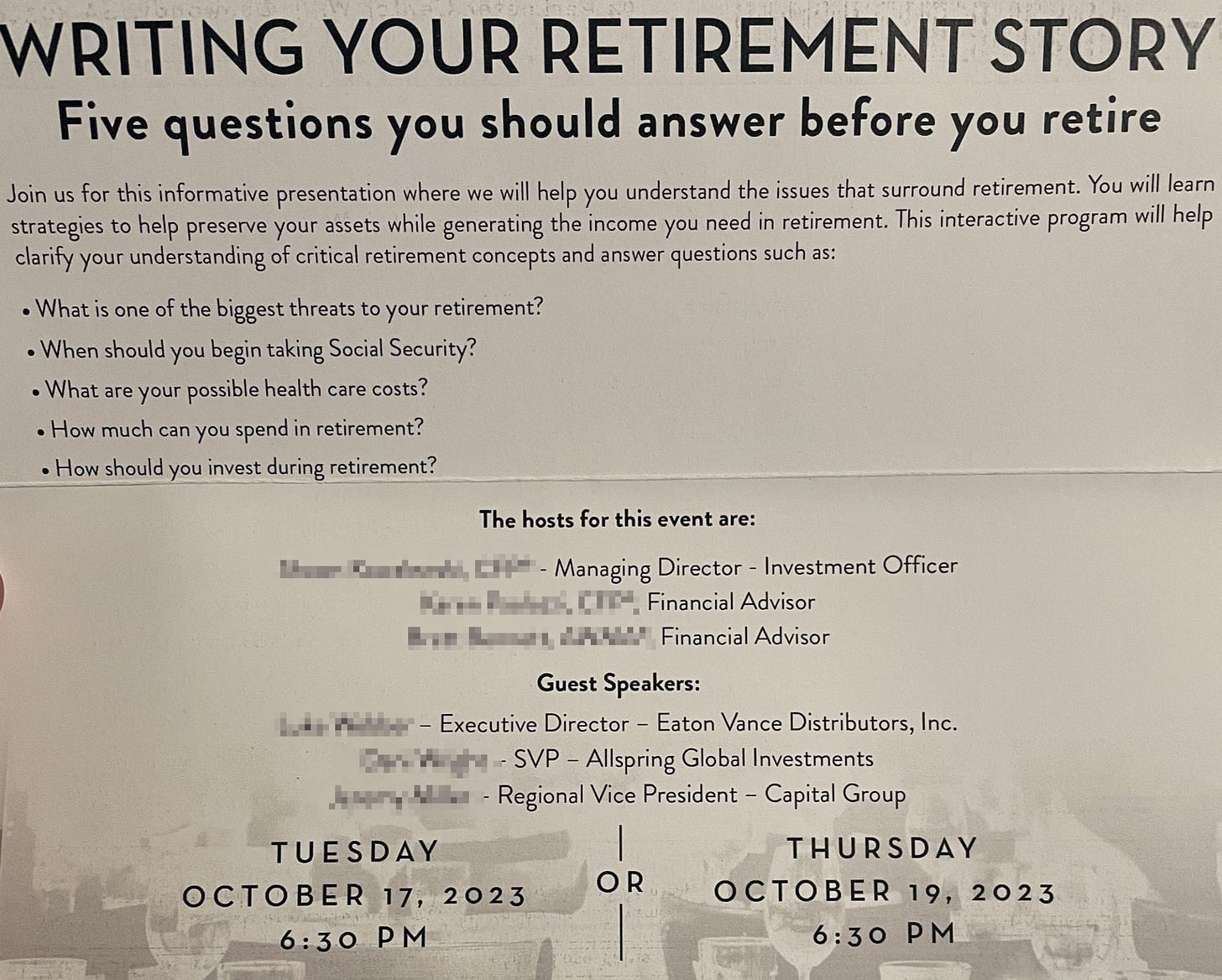Good morning,
Company conference season is apparently in full swing.
Elizabeth returns home later today from her company conference in Nashville.
And on Sunday, I’m leaving for a couple of days in Richmond for my company conference.
But company conferences aren’t all that happening.
Elizabeth and I find ourselves on a mailing list for those educational dinners hosted by financial advisors.
Guess we’ve aged into their target market.
We’ve received 3 of them in the past week alone.
You know the ones I’m talking about…
“Come join us for a free dinner at a nice restaurant while we scare educate you about retirement.”
Several of you have told me you get these from time time.
Here’s one that was in our mailbox:
I’ve intentionally blurred the names of the advisors and the guest speakers.
And while I’m no psychology expert, there’s definitely some psychology at play here.
Something you might want to think about.
Or at least be aware of.
This particular dinner is being hosted by 3 advisors from Wells Fargo.
I don’t know them. I’m not here to criticize anything they’re doing.
But I would like to highlight a couple of things.
I know a little about these types of events because about 20 years ago, I hosted a handful of these myself.
And I’m regularly pitched by the companies that organize and market these dinner events to financial advisors like me.
First the fine print included in the mailer we received:
Wells Fargo is not a tax or legal advisor. The seminars are sponsored by Eaton Vance Distributors, Inc., Allspring Global Investments, and Capital Group. This event is educational in nature and no mutual fund or annuity company specific products will be discussed…
These seminars are “sponsored” by the companies represented by the 3 guest speakers. That means that the 3 companies are paying for most if not all of these events.
And between printing and mailing out several thousand invitations, managing the logistics with the restaurant, handling RSVPs, and the actual meal, a single dinner seminar can easily cost well north of $5,000.
But I’m not begrudging anyone for investing in the marketing of their business or their services.
I just want to set the stage to discuss the influence and persuasion that’s baked into this process.
To do so, I’ll refer you to the book Influence: The Psychology of Persuasion by Robert Cialdini.
Here’s a summary of the book if you’re interested.
Cialdini’s six principles of persuasion are:
Reciprocity
Commitment
Social Proof
Authority
Liking
Scarcity
And this dinner seminar - from the invitation to the actual dinner presentation - utilize virtually every one of the six principles above.
To wit…
This invitation wasn’t a typed business letter in a #10 envelope.
Instead it’s a glossy, 3-color, tri-fold mailer on heavy card stock that looks and feels nice. Classy. Expensive.
That’s the authority principle on display. ✅
The top of the invitation which I didn’t capture in my pic above reads as follows:
“You and an adult guest are cordially invited to attend a seminar presentation. This education event is by invitation only. Our events fill up quickly, so guarantee your reservation today by calling…”
The bold highlights above are mine.
These are examples of scarcity, commitment, social proof, and reciprocity. ✅
How about the “Five questions you should answer before you retire” as seen in the image above?
The implication here is they have the answers, or can at least help you discover the answers.
Authority principle ✅
But wait, there’s more…
If these advisors buy you dinner, the reciprocity principle says you’ll be more open to their inevitable offer of a free consultation to discuss your financial situation in more detail.
Again, this isn’t wrong or a bad thing; just something to be aware of.
And get this, since the 3 asset management firms sponsoring the dinner are presumably picking up the lion’s share of the cost for this event, they’re also relying on reciprocity.
The advisors will - based on reciprocity - be more likely to invest clients’ portfolios with these companies and their products.
And if you show up and there’s a dining room full of other folks who are also interested to get answers to the 5 retirement questions, that’s social proof in action.
Again, I’m no psychologist. There’s probably a lot I’m missing here.
However, I think it’s helpful for you to understand how financial services marketing works - in this case among financial advisors - to help you make more informed decisions with your money and your financial future.
This isn’t to say I’m a better option than these advisors.
And I’m not suggesting they’re doing anything shady or wrong.
Just know that these dinner seminars aren’t really free.
You’re paying with your time and attention.
The advisors and/or asset management companies are paying with their actual dollars.
And influence and persuasion are at play throughout.
For more, read this article about how to use the 6 principles of persuasion from a marketer’s perspective.
I utilize these principles of influence as well.
In my writing. In my conversations. And elsewhere.
Some of it conscious. Much of it not.
I even pick up the occasional breakfast or lunch tab with a client, potential client, CPA, or attorney.
Is this because I’m using a subtle, psychological influence technique? Or am I simply paying for a meal?
I’ll let you be the judge… 😉
Have a wonderful Wednesday!
Links & Things
There’s no shortage of doom & gloom on the internet and 24-hour news channels. But despite the negative news bias (another bit of psychology), the world continues to get better and better. As an example, visit this site and enter your year and country of birth for some interesting and positive statistics.
A collection of good reminders and helpful thoughts from Morgan Housel:
Thank You!
I’m glad you’re here. And I’m grateful to have you as a reader.
If you have any questions or an idea for a future email letter, blog post, or YouTube video, I'd love your input.
Or if you just want to say hi 👋
Simply hit reply - I read (and genuinely appreciate) each and every message you send.
Until next Wednesday,
Russ





